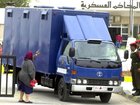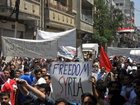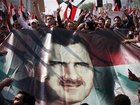Spotlight
Hundreds of Coptic Christians marching in Cairo on Thursday came under attack by assailants throwing stones and bottles and 25 people were lightly injured in subsequent clashes, a security official said.
They were marching to demand justice for the Christian victims of a clash with soldiers in October that left at least 25 people dead, most of them Christians.
 Full Story
Full Story
Catherine Ashton, the European Union's foreign affairs chief, said Thursday that Syria's President Bashar al-Assad should step aside amid intensifying pressure on his authorities to end violence.
"It's time for President Assad to stand down," Ashton said following talks with Russian Foreign Minister Sergei Lavrov in Moscow.
 Full Story
Full Story
The U.N. atomic watchdog said Thursday a visit by inspectors to Syria last month made "no progress" in clarifying the use of a suspected covert nuclear reactor allegedly bombed by Israel in 2007.
"Unfortunately, no progress was made in meetings with the Syrian authorities on obtaining the full access which we have requested," International Atomic Energy Agency head Yukiya Amano said.
 Full Story
Full Story
Rebel troops hit offices of Syria's ruling party on Thursday, a day after a daring raid on an intelligence base that prompted Russia to warn that its longtime ally risks "full-scale civil war."
The rocket-propelled grenade attack in northwestern Idlib province, near Turkey, came as security forces killed eight people, including two children, despite an Arab League ultimatum that Syria halt the bloodshed or risk sanctions.
 Full Story
Full Story
Iraq's anti-U.S. Shiite cleric Moqtada al-Sadr has expressed support for Syrian President Bashar al-Assad, while noting that he sympathizes with the “revolutionaries” in Syria.
Assad has since March been trying to crush a popular uprising against his government, in which over 3,500 people have been killed, according to U.N. figures.
 Full Story
Full Story
Residents of a border town went on an overnight rampage after a Jordanian, who allegedly helped two Syrians buy arms, died in detention, police said on Thursday.
Angry protesters in Ramtha, a town north of Amman and near the border with Syria, set fire to the governor's offices, the courthouse and a police car before a riot squad broke up the demonstration using tear gas.
 Full Story
Full Story
The leader of Syria's exiled Muslim Brotherhood said Thursday that his compatriots would accept Turkish "intervention" in the country to resolve months of bloody unrest.
"The Syrian people would accept intervention coming from Turkey, rather than from the West, if its goal was to protect the people," Muslim Brotherhood leader Mohammad Riad Shakfa told a press conference.
 Full Story
Full Story
Syria said it has issued a warning to its citizens that they would be arrested and prosecuted if they took part in further attacks on embassies.
"The interior ministry will take all necessary measures, including the arrest and trial, of any person seeking to attack diplomatic missions," the state news agency SANA reported.
 Full Story
Full Story
Kuwait's emir, Sheikh Sabah al-Ahmed al-Sabah, on Thursday ordered the national guard and security forces to take all "necessary" measures to maintain security in the Gulf state.
The order was issued in a statement by the cabinet which held an emergency meeting chaired by the emir, a day after opposition-led protesters calling for the premier's resignation stormed the parliament building.
 Full Story
Full Story
Germany, Britain and France are pressing for a U.N. resolution that would strongly condemn Syria's human rights violations and call for an immediate halt to all violence in the country.
The three European countries decided to move ahead with the General Assembly resolution after the Arab League confirmed its suspension of Syria Wednesday and gave Bashar Assad's government three days to halt the violence against civilians and accept an observer mission or face economic sanctions.
 Full Story
Full Story




